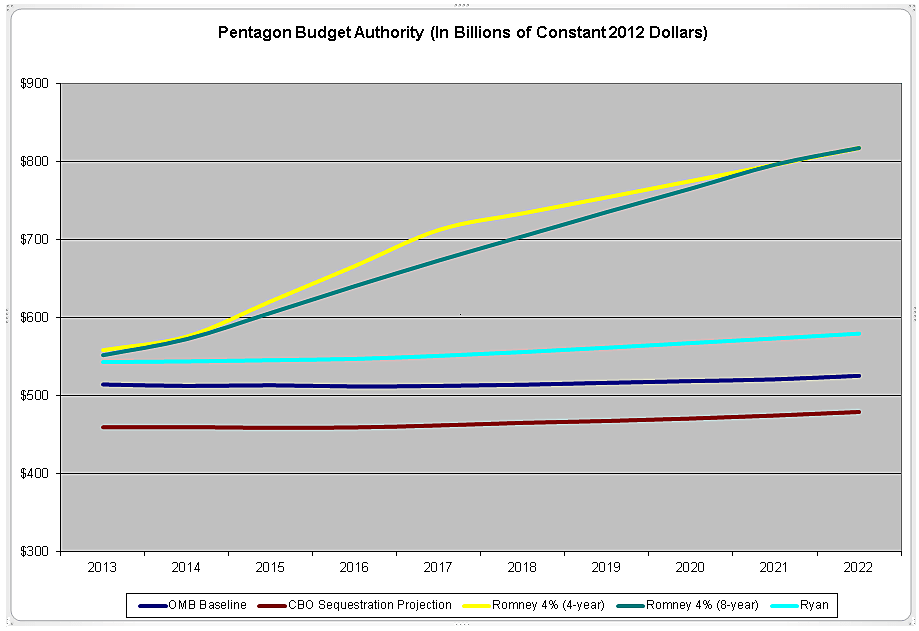A Politico article on Paul Ryan’s views on the Pentagon’s budget concludes:
A key question for the coming weeks will be how Ryan, one of Washington’s biggest budget wonks, interprets and explains the Romney campaign’s positions on defense spending. That could be a clue as to how realistic he actually believes they are.
I certainly hope so.
I was among the first to comment on Romney’s plan to spend at least four percent of GDP on the Pentagon’s base budget (war costs would be extra), and have revisited the question several times since. I have separately looked at Paul Ryan’s budget (here and here), and pointed out how military spending increased under his plan, just not as much as Romney.
During a series of lectures over the past several months, and with help from Charles Zakaib and Andy Stravers, I’ve included a variation on the chart at bottom, showing Romney’s four percent plan (achieved within four and eight years); projected Pentagon spending under the Ryan plan; the current baseline per OMB; and the levels called for under sequestration, per CBO’s latest (.pdf). I’ve adjusted these for inflation from DoD’s 2012 Green Book (.pdf) for 2012–2016, and extrapolated over the out years. I’ve estimated Romney’s totals using CBO’s GDP estimates (Romney’s own projections assume higher GDP, and therefore more military spending than shown here).
Here is how the totals shake out relative to the current baseline over the ten-year period, 2013–2022, in constant dollars:
- Romney 4 percent in four years: $1,852 billion in additional spending
- Romney 4 percent in eight years: $1,704 billion in additional spending
- Ryan plan: $409 billion in additional spending
- Sequestration: $504 billion in savings
By pledging to increase the military’s budget above the rate of inflation, Ryan’s basic argument is that the Pentagon’s budget should remain near historic highs in real, inflation-adjusted terms. That would mean spending more than we did during much of the Cold War, and much more than we did in the 1990s. I think we are safer now than when we were confronting the Soviet Union, and that we could and should spend less. I hope that reporters and prospective voters will ask Paul Ryan if he thinks we are safer. His budget implies that we are not.
Still, Ryan has not (yet) endorsed the kinds of massive military spending increases that Romney champions. What’s more, the Ryan plan spelled out specific proposals for cutting domestic spending, both discretionary programs and entitlements, that would allow the Pentagon’s budget to grow above the current baseline. Mitt Romney has not.
So how will Paul Ryan help Mitt Romney make up the difference? What additional spending will be cut, taxes raised, or debt increased?
As I explain in today’s Cato Daily Podcast, I anxiously await the answer.

